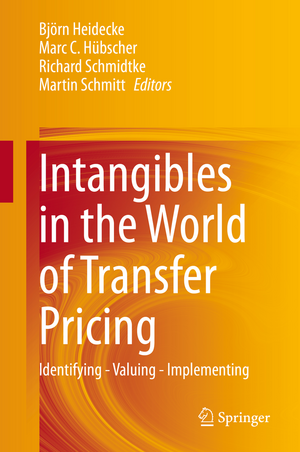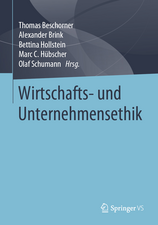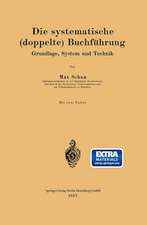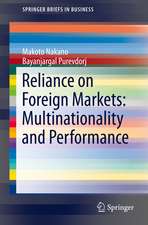Intangibles in the World of Transfer Pricing: Identifying - Valuing - Implementing
Editat de Björn Heidecke, Marc C. Hübscher, Richard Schmidtke, Martin Schmitten Limba Engleză Hardback – 25 ian 2021
Edited by leading transfer pricing and valuation experts in Europe, this comprehensive book offers practitioners an effective road map for identifying, valuing and implementing intangibles for transfer pricing purposes under consideration of both the OECD and local perspectives. It is therefore a must-have book for transfer pricing and valuation practitioners on all levels of experience. The book starts with an introduction to the role of intangibles in the world of transfer pricing including typical intangibles migration models. It describes common intangible assets across all types of industries, including e.g. automotive, consumer goods and software.Using several numerical examples, the book then covers state-of-the-art valuation methods including how to apply these methods in practice in a way consistent with the OECD Transfer Pricing Guidelines. The different country chapters written by local experts provide country-specific guidance on the legal framework concerning intangible assets from a transfer pricing and valuation perspective. Finally, the book covers practical advice on the implementation of an intangible assets system.
This book offers invaluable guidance to practitioners seeking tools to apply the arm’s length principle in theworld of intangibles.
Preț: 808.27 lei
Preț vechi: 985.70 lei
-18% Nou
Puncte Express: 1212
Preț estimativ în valută:
154.68€ • 167.96$ • 129.93£
154.68€ • 167.96$ • 129.93£
Carte tipărită la comandă
Livrare economică 22 aprilie-06 mai
Preluare comenzi: 021 569.72.76
Specificații
ISBN-13: 9783319733319
ISBN-10: 3319733311
Pagini: 860
Ilustrații: XII, 723 p. 68 illus., 47 illus. in color.
Dimensiuni: 155 x 235 mm
Greutate: 1.2 kg
Ediția:1st ed. 2021
Editura: Springer International Publishing
Colecția Springer
Locul publicării:Cham, Switzerland
ISBN-10: 3319733311
Pagini: 860
Ilustrații: XII, 723 p. 68 illus., 47 illus. in color.
Dimensiuni: 155 x 235 mm
Greutate: 1.2 kg
Ediția:1st ed. 2021
Editura: Springer International Publishing
Colecția Springer
Locul publicării:Cham, Switzerland
Cuprins
Part I: Intangibles in the World of Transfer Pricing.- Definition and identification of Intangibles.- Allocation of IP for TP Purposes.- Overview of IP Migration Models.- Empirical Evidence on Various Models.- What’s Different? – Intangibles in the Mid-Market.- Understanding the Reporting of Intangibles from a Business Perspective.- Intangibles in Different Industries.- The miracle of brand value creation: Where does the value come from?.- Valuation: Understanding, assessing and documenting.- Part II: Finding the Arm’s Length Price for Intangibles.- Structuring a license system.- Contract Research and Development.- Pool Concept
Chapter II.4 - Transactional Profit Split Method.- Part III: The Nighty Gritty Details on Valuation.- Please mind the gap. Arm´s length prices and fair market value.- Market approach.- Relief From Royalty.- MEEM.- Incremental cash flow method.- Cost approach.- Calculating Planning Data and Its Plausibility.- Discount rates.- Part IV: Country Perspective of Intangibles from a Transfer Pricing Perspective.- Introduction.- Austria.- Belgium.- Brazil.- Canada.- China.- East Africa.- France.- Germany.- Ghana.- India.- Italy.- Mexico.- Middle East.- Nigeria.- Poland.- Russia.- Spain.- Sweden.- United Kingdom.- CJEU Court Cases – IP and Taxation.- Part V: Implementing Intercompany Intangible Systems.- Withholding Tax Aspects of License Models.- A legal review of IP migrations.- IP from an M&A Tax Perspective.- Intellectual Property from a Customs Perspective.
Notă biografică
Dr. Björn Heidecke studied Economics (Diploma) and Vocationomics (Diploma) at Kiel University. He holds a PhD in economics from Chemnitz University. Björn is a Transfer Pricing Director with Deloitte Germany (Hamburg) with a focus on intangible assets transactions, business model optimizations, profit splits and economic modeling. He develops tax and transfer pricing learnings in-house and for multinational. He publishes frequently in national and international Journals on Transfer Pricing and related matters. He is co-editor on a handbook on Transfer Pricing and Relocation of Functions. He is an alumnus of the Hanns Martin Schleyer foundation and a member of the Deutsche Gesellschaft für ökonomische Bildung. Björn teaches Transfer Pricing at the Internal University of the German Tax Authorities.
Dr. Marc C. Hübscher studied Business Administration (Diploma) and Vocationomics (Diploma) at Oldenburg University. He holds a PhD in economics from Oldenburg University. Marc isa Partner with Deloitte Germany (Hamburg) in the Financial Advisory team responsible for Valuation and Modeling. His expertise comprises business valuation and business modeling, valuation of intangible and tangible assets, purchase price allocations as well as modeling of integrated corporate planning tools for both strategic and financial investors. He has advised clients at the interface of transfer pricing and valuation. He publishes frequently on valuation as well as business ethics and co-edits the German Journal for Business Ethics. Marc teaches controlling and leadership at the University of Ulm as well as Göttingen and holds memberships of the Verein für Socialpolitik and the Deutsche Gesellschaft für Philosophie.
Dr. Richard Schmidtke studied economics (Diploma) in Munich and Toulouse and holds a PhD in economics from the University of Munich. Furthermore, he holds a Master in Accounting and Taxation from the Business School Mannheim and is a CFA Charterholder. Richard is a certified German tax advisor. He is a Transfer Pricing Partner with Deloitte (Munich). Richard has advised clients on IP transfer pricing planning, business model optimization and transfer pricing documentation work. Richard has published various articles in national and international tax and transfer pricing journals. Most of his publications deal with business restructurings, compensation payments and IP migration topics. Richard teaches transfer pricing at the Business School Mannheim, the Catholic University Eichstätt-Ingolstadt and at the Internal University of the German Tax Authorities.
Martin Schmitt has a broad international education in economics and business administration having graduated from London School of Economics and Political Science (LSE) and University of Mannheim and having also studied at ESSEC in Paris (MBA program) and at UFRJ in Rio de Janeiro. Martin is a Transfer Pricing Partner with Deloitte Germany (Frankfurt) since 2015 having previouslyworked as Transfer Pricing Director in NYC. Martin specializes in cross-border tax planning for international groups, with an emphasis on transfer pricing structuring and litigation support. Martin also concluded one of the first MAPs between Germany and the US in line with the revised DTT dating 2008.
Dr. Marc C. Hübscher studied Business Administration (Diploma) and Vocationomics (Diploma) at Oldenburg University. He holds a PhD in economics from Oldenburg University. Marc isa Partner with Deloitte Germany (Hamburg) in the Financial Advisory team responsible for Valuation and Modeling. His expertise comprises business valuation and business modeling, valuation of intangible and tangible assets, purchase price allocations as well as modeling of integrated corporate planning tools for both strategic and financial investors. He has advised clients at the interface of transfer pricing and valuation. He publishes frequently on valuation as well as business ethics and co-edits the German Journal for Business Ethics. Marc teaches controlling and leadership at the University of Ulm as well as Göttingen and holds memberships of the Verein für Socialpolitik and the Deutsche Gesellschaft für Philosophie.
Dr. Richard Schmidtke studied economics (Diploma) in Munich and Toulouse and holds a PhD in economics from the University of Munich. Furthermore, he holds a Master in Accounting and Taxation from the Business School Mannheim and is a CFA Charterholder. Richard is a certified German tax advisor. He is a Transfer Pricing Partner with Deloitte (Munich). Richard has advised clients on IP transfer pricing planning, business model optimization and transfer pricing documentation work. Richard has published various articles in national and international tax and transfer pricing journals. Most of his publications deal with business restructurings, compensation payments and IP migration topics. Richard teaches transfer pricing at the Business School Mannheim, the Catholic University Eichstätt-Ingolstadt and at the Internal University of the German Tax Authorities.
Martin Schmitt has a broad international education in economics and business administration having graduated from London School of Economics and Political Science (LSE) and University of Mannheim and having also studied at ESSEC in Paris (MBA program) and at UFRJ in Rio de Janeiro. Martin is a Transfer Pricing Partner with Deloitte Germany (Frankfurt) since 2015 having previouslyworked as Transfer Pricing Director in NYC. Martin specializes in cross-border tax planning for international groups, with an emphasis on transfer pricing structuring and litigation support. Martin also concluded one of the first MAPs between Germany and the US in line with the revised DTT dating 2008.
Textul de pe ultima copertă
Intangible assets are becoming increasingly important as value drivers for multinational companies. It is a strategic question how to allocate intangibles within the multinational corporation. It needs to be defined by whom and under which conditions they can be utilized. Typical IP migration models such as licensing, joint development and transferring are becoming a focal point within tax audits across the globe. Hence,defining an intangibles system that fulfils the tax requirements is of utmost strategic importance for multinational corporations. A central question is how to value intangibles in line with the arm’s length principle as is required internationally for transfer pricing purposes.
Edited by leading transfer pricing and valuation experts in Europe, this comprehensive book offers practitioners an effective road map for identifying, valuing and implementing intangibles for transfer pricing purposes under consideration of both the OECD and local perspectives. It is therefore a must-have book for transfer pricing and valuation practitioners on all levels of experience.
The book starts with an introduction to the role of intangibles in the world of transfer pricing including typical intangibles migration models. It describes common intangible assets across all types of industries, including e.g. automotive, consumer goods and software.Using several numerical examples, the book then covers state-of-the-art valuation methods including how to apply these methods in practice in a way consistent with the OECD Transfer Pricing Guidelines. The different country chapters written by local experts provide country-specific guidance on the legal framework concerning intangible assets from a transfer pricing and valuation perspective. Finally, the book covers practical advice on the implementation of an intangible assets system.
This book offers invaluable guidance to practitioners seeking tools to apply the arm’s length principle in theworld of intangibles.
Edited by leading transfer pricing and valuation experts in Europe, this comprehensive book offers practitioners an effective road map for identifying, valuing and implementing intangibles for transfer pricing purposes under consideration of both the OECD and local perspectives. It is therefore a must-have book for transfer pricing and valuation practitioners on all levels of experience.
The book starts with an introduction to the role of intangibles in the world of transfer pricing including typical intangibles migration models. It describes common intangible assets across all types of industries, including e.g. automotive, consumer goods and software.Using several numerical examples, the book then covers state-of-the-art valuation methods including how to apply these methods in practice in a way consistent with the OECD Transfer Pricing Guidelines. The different country chapters written by local experts provide country-specific guidance on the legal framework concerning intangible assets from a transfer pricing and valuation perspective. Finally, the book covers practical advice on the implementation of an intangible assets system.
This book offers invaluable guidance to practitioners seeking tools to apply the arm’s length principle in theworld of intangibles.
Caracteristici
Presents a broad overview of all aspects of valuation focusing on different types of industries Includes a synoptic table that summarizes the legal requirements in the different jurisdictions to easily see if a certain method is applicable Identifies industry-specific key success factors to ensure they are reflected in the valuation model




















